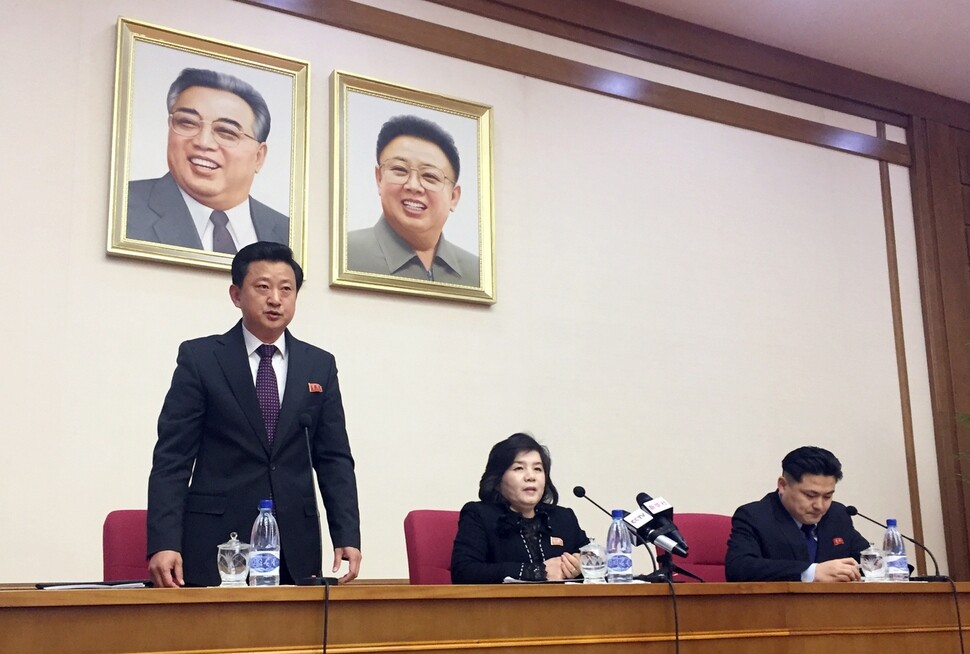hankyoreh
Links to other country sites 다른 나라 사이트 링크
North Korean media continues to refrain from reporting on Choe Son-hui’s press conference

North Korea’s three major news outlets – the Rodong Sinmun newspaper, the Korean Central News Agency (KCNA) and Korean Central Television (KCTV) – continued for a third straight day with no reports on the Pyongyang press conference given by Vice Foreign Minister Choe Son-hui on Mar. 15. Similarly, they have yet to report on details from a press conference given by Foreign Minister Ri Yong-ho after midnight on Feb. 28 following the second North Korea-US summit in Hanoi, which ended without an agreement.
This is a repeating pattern: a message is relayed to the US through a press conference, but not reported internally. It signals that Pyongyang is not yet ready to officially revise the position stated on the front page of the Rodong Sinmun’s Mar. 1 edition, which stated that leader Kim Jong-un and US President Donald Trump had “increased their mutual trust and respect” and “agreed to continue with productive dialogue.”
“It seems to indicate their plans to observe the other side’s response before deciding their future course of action,” said a senior South Korean government official on Mar. 17.
Indeed, Choe’s declaration that Pyongyang “has no intention of conceding to US demands in any forms” essentially echoed the position previously voiced by Ri, who said there would “no changes to our plan even if the US proposes negotiations again.” Both drew a firm line against any concessions.
But one difference between them is worth noting: while Ri made no mention of a future “action plan” in his conference, Choe’s message alluded to actions by top leadership. Specifically, she said the continuation of a 15-month-long moratorium on nuclear tests and ballistic missile launches was “wholly dependent on the determination of our State Affairs Commission chairman [Kim Jong-un].” As a message of pressure and warning against the US, it skirts the danger zone.
North sounds out US response without changing official position
“The North’s decision to have Choe speak rather than issuing an official statement could be seen as sounding out the US’ response for the time being,” suggested a former senior official and veteran North Korea watcher.
The official also suggested there was a “substantial risk of the North taking ‘action’ if no measures are taken to stabilize the situation.” This explains the need to focus on Choe’s message that North Korea’s “supreme leadership appears poised to make its decision shortly.” At the same time, she did not specify that Kim himself would be the agent behind the “decision,” and the fact that the remarks took the form of “speculation” rather than a “warning” makes their implications difficult to judge.
“This is a moment when the roles of South Korea and China – the role of Chinese President Xi Jinping in particular – are crucially important,” said one former senior official.
“A realistic approach would be for Xi to send a special envoy to the North to precisely determine Kim’s intentions and establish a firm foundation again for negotiations,” the official suggested.
At their fourth summit on Jan. 8, Kim reminded Xi of a previous pledge to “manage the political situation on the Korean Peninsula and engage in the denuclearization talks process as well as joint research and navigation,” according to a front-page article in the Jan. 10 edition of the Rodong Sinmun.
By Lee Je-hun, senior staff writer
Please direct comments or questions to [english@hani.co.kr]

Editorial・opinion
![[Column] Season 2 of special prosecutor probe may be coming to Korea soon [Column] Season 2 of special prosecutor probe may be coming to Korea soon](https://flexible.img.hani.co.kr/flexible/normal/500/300/imgdb/original/2024/0426/3317141030699447.jpg) [Column] Season 2 of special prosecutor probe may be coming to Korea soon
[Column] Season 2 of special prosecutor probe may be coming to Korea soon![[Column] Park Geun-hye déjà vu in Yoon Suk-yeol [Column] Park Geun-hye déjà vu in Yoon Suk-yeol](https://flexible.img.hani.co.kr/flexible/normal/500/300/imgdb/original/2024/0424/651713945113788.jpg) [Column] Park Geun-hye déjà vu in Yoon Suk-yeol
[Column] Park Geun-hye déjà vu in Yoon Suk-yeol- [Editorial] New weight of N. Korea’s nuclear threats makes dialogue all the more urgent
- [Guest essay] The real reason Korea’s new right wants to dub Rhee a founding father
- [Column] ‘Choson’: Is it time we start referring to N. Korea in its own terms?
- [Editorial] Japan’s rewriting of history with Korea has gone too far
- [Column] The president’s questionable capacity for dialogue
- [Column] Are chaebol firms just pizza pies for families to divvy up as they please?
- [Column] Has Korea, too, crossed the Rubicon on China?
- [Correspondent’s column] In Japan’s alliance with US, echoes of its past alliances with UK
Most viewed articles
- 1Division commander ordered troops to enter raging flood waters before Marine died, survivor says
- 2‘We must say no’: Seoul defense chief on Korean, USFK involvement in hypothetical Taiwan crisis
- 3Is N. Korea threatening to test nukes in response to possible new US-led sanctions body?
- 4No good, very bad game for Korea puts it out of Olympics for first time since 1988
- 5Korea’s 1.3% growth in Q1 signals ‘textbook’ return to growth, says government
- 6US overtakes China as Korea’s top export market, prompting trade sanction jitters
- 7[Column] Has Korea, too, crossed the Rubicon on China?
- 8[Column] ‘Choson’: Is it time we start referring to N. Korea in its own terms?
- 9Will NewJeans end up collateral damage in internal feud at K-pop juggernaut Hybe?
- 10Samsung subcontractor worker commits suicide from work stress